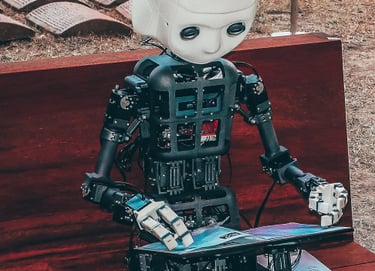The Rise of Artificial Intelligence Revolutionizing Routine Human Functions
Artificial intelligence (AI) has emerged as one of the most transformative technologies of the modern era. With its unprecedented ability to analyze vast amounts of data, learn from patterns, and make autonomous decisions, AI is poised to revolutionize numerous industries and change the way we live and work. In this article, we will delve into the reasons why AI is expected to replace most routine functions currently performed by humans. We will explore the capabilities of AI, the advantages it offers, potential challenges, and the anticipated impact on various sectors of the economy.


I. Understanding Artificial Intelligence: To comprehend the potential impact of AI on routine functions, it is crucial to understand what AI truly represents. Artificial intelligence refers to computer systems that possess the ability to perform tasks that would typically require human intelligence. These tasks include speech recognition, visual perception, decision-making, problem-solving, and more. AI can be broadly categorized into narrow or weak AI, which is designed for specific tasks, and general or strong AI, which has the ability to perform any intellectual task that a human can.
II. The Advantages of AI in Routine Functions:
Efficiency and Accuracy: AI systems excel at processing and analyzing vast amounts of data, leading to increased efficiency and accuracy compared to human counterparts. AI algorithms can quickly and accurately identify patterns, detect anomalies, and make data-driven decisions, resulting in improved outcomes and reduced errors.
Automation: One of the key advantages of AI is its ability to automate routine tasks. By automating repetitive and mundane functions, AI liberates human workers from monotonous work, allowing them to focus on higher-value tasks that require creativity, critical thinking, and emotional intelligence.
Scalability and Consistency: AI systems can operate consistently and scale effortlessly, enabling organizations to handle large volumes of work without compromising quality. Unlike humans, AI algorithms do not experience fatigue, boredom, or distractions, ensuring a consistent level of performance throughout extended periods.
III. AI's Impact on Various Industries:
Manufacturing: AI-powered robots and automation systems are transforming the manufacturing sector by taking over repetitive and dangerous tasks. These robots can operate continuously, with higher precision and speed, leading to increased productivity and reduced costs.
Healthcare: AI has the potential to revolutionize healthcare by assisting in diagnostics, drug discovery, personalized treatment plans, and patient monitoring. Machine learning algorithms can analyze medical records, detect patterns, and provide accurate diagnoses, improving patient outcomes and reducing healthcare costs.
Customer Service: Chatbots and virtual assistants powered by AI are becoming increasingly prevalent in customer service. These AI systems can understand natural language, provide instant responses, and handle customer inquiries and complaints, enhancing customer satisfaction and reducing response times.
Transportation: The transportation industry is undergoing a significant transformation with the advent of autonomous vehicles. AI algorithms enable self-driving cars to navigate, interpret traffic conditions, and make real-time decisions, promising increased road safety and improved transportation efficiency.
Finance: AI is revolutionizing the financial industry by automating tasks such as fraud detection, algorithmic trading, and customer risk assessment. AI-powered systems can analyze vast amounts of financial data, identify patterns, and make data-driven investment decisions faster and more accurately than humans.
IV. Challenges and Considerations:
Ethical Concerns: As AI becomes more integrated into various aspects of society, ethical considerations arise. Questions surrounding privacy, data security, bias, and the potential for job displacement must be addressed to ensure responsible AI development and deployment.
Adaptability and Training: As routine tasks become automated, the workforce needs to adapt and acquire new skills to remain relevant. Education and training programs must be established to equip individuals with the necessary knowledge and abilities to work alongside AI systems effectively.
Human-Machine Collaboration: Rather than replacing humans outright, AI has the potential to augment human capabilities. The successful integration of AI requires re-imagining work structures to facilitate seamless collaboration between humans and machines, leveraging the unique strengths of each.
V. Artificial intelligence has the potential to revolutionize the way we work and live. As AI systems continue to advance, they are poised to replace routine functions currently performed by humans. The benefits of increased efficiency, cost reduction, and elimination of human error are too significant to ignore. However, challenges such as job displacement, bias, and ethical concerns must be addressed to ensure a smooth transition to a future where humans and AI work collaboratively. By embracing AI and reshaping our approach to work, we can unlock new opportunities for creativity, innovation, and societal progress. The future of work is not about humans versus machines; it is about humans working alongside intelligent machines to create a better, more efficient world, given the alternative, appears to be a win/win situation.
